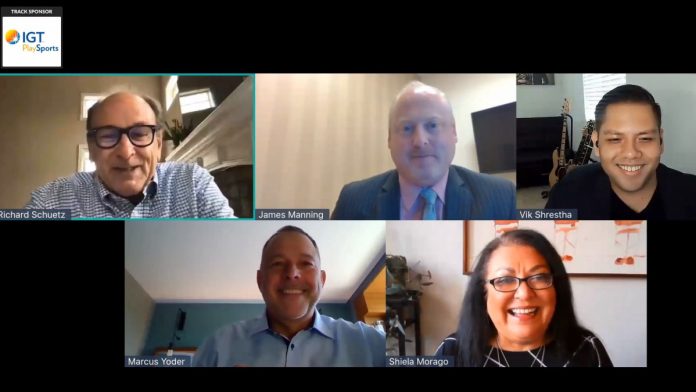Last month, the secretary of state’s office announced that an 18-tribe coalition had obtained enough signatures on initiative petitions to place their expansion measure on the November 2022 ballot.
The coalition launched its campaign after efforts to forge a compromise sports wager law – which would blunt efforts to legalize online sports betting – had failed.
Fearing a lack of footfall in its casinos if gamblers could place sports bets on their computers, the law would be obsolete if sports betting could only be done legally inside casinos.
Speaking as part of an IGT-sponsored panel on day one of SBC Digital North America, Richard Schuetz, CEO of Schuetz LLC and panel moderator, asked panellists how they would vote on the November 2022 bill, with all giving an overwhelming response.
Sheila Morago, Executive Director at OIGA, noted that in-person and online sports betting across California is something that the tribes involved really want and, though it’s taken a lot of time to get done, it’s more ideal than the alternative of having no input.
She explained: “It is a big market and it’s something that all of the sports suppliers are going to want to get in on because it is the second-largest market in the United States. It can be its own little world into itself.”
Relaying the thoughts of Morago, Marcus Yoder – Senior Vice President at GAN – emphasized that legal sports betting in California was the ‘logical step’ to continue expanding the opportunities available for the tribal gaming operators.
“I’m ecstatic that it is going to take this long because it is the right way to go,” noted Yoder. “Additionally, this gives each of the tribal operators the time to hire, train, and become good at being sportsbook operators, just as good as they are at being casino operators.
“It also makes it so we’re all not running frantically at the same target, even though it is a huge target and hopefully everyone is going to get some slice of the pie. It’s going to allow all of us to execute on this in a thoughtful and less expensive manner where we don’t make stupid mistakes, we don’t throw money where we shouldn’t be and that’s across the board.”
Vik Shrestha, Senior Director PlaySports at IGT, expressed his excitement for the market following his meeting with various tribes in the state of California over the last couple of years and pinpointed its forward-thinking approach.
He added: “What’s actually very exciting is many of the RFP’s that the tribes are putting out; they’re also having sections for igaming so there’s a lot of forward-thinking that goes along with just sports betting and really looking at a broader picture of digital gaming in general.
“Yes, igaming may not be legal any time soon but to have the proper plans and steps to get that solution going, it’s exciting to see these tribes really thinking about the future to build up a proper revenue stream.”
Moving the session forward, Schuetz pressed the panellists to give some advice on how individual tribes can approach its regulatory journey and how they can define their operational strategies whilst also establishing a blueprint for the next stages of tribal sports betting in North America.
James Manning, Director of Slot Operations at Snoqualmie Casino, highlighted that the pool of resources and experts is ‘pretty minimal’’.
Providing his own experience with Snoqualmie Casino, Manning explained: “For us, I felt it is very important to vet the sports betting partners such as IGT, GAN, Kambi very early on so you can find a solution that’s going to work.
“You also want to get a partner onboard early so that when you’re going through that regulatory journey, you have an expert to bounce ideas off – you’re therefore not putting yourself in a restrictive pigeon hole that you’re going to regret later. You really need to reach out to some of those, especially the tribal entities that have bought sports gaming on.”
Yet, citing advice for all tribes – and not just those based in California – Shrestha implored tribes to spend time on educating themselves on sports betting by attending seminars and to understand who the players are in the market.
He went on to pinpoint tribes must focus on how they are going to project their revenues. He continued: “If you have to focus more on EBITA rather than top-line revenues and spending all your money on marketing like these B2C companies do, really understand the model you want to pursue.”
Echoing Shrestha, Manning added: “You should assign someone to really own this, with maturity and experience of the actual operations within the casino, the philosophy and the approach of the tribal council and to take all of that into consideration. You can then move forward with doing the education and doing the analysis.
“Setting that expectation with tribal council is really going to be critical. Set it low and then you’ll be pleasantly surprised.”
Voicing support for the other panellists, Morago highlighted that due to the size of California, tribal operators must always remember time frames when seeking NIGC approval.
“The longer you wait, the longer it’s going to take to approve things as you’ll be at the back of the queue,” concluded Morago. “Plan ahead and know where your lead times are because I can imagine everyone in California dumping and asking for declaration letters all at one time at the NIGC and they will be bound to whatever their timeline is.”
The industry experts were speaking on the GAN-sponsored Leaders in igaming track at SBC Digital North America, which ran from June 9 to 10, 2021. You can still watch it on demand by registering at https://sbcevents.com/sbc-digital-north-america

